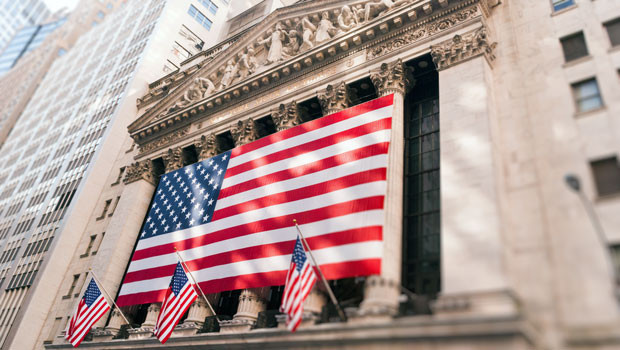US close: Stocks sharply lower as recession fears resurface

Wall Street stocks closed sharply lower on Thursday as recessionary fears resurfaced.
At the close, the Dow Jones Industrial Average was down 1.21% at 40,347.97, while the S&P 500 lost 1.37% to 5,446.68 and the Nasdaq Composite saw out the session 2.30% weaker at 17,194.15.
The Dow closed 494.82 points lower on Thursday, more than reversing gains recorded in the previous session as hawkish comments from the head of the Federal Reserve ignited stocks with hopes rising for an interest-rate cut at the central bank's next meeting in September.
The Fed's two-day policy meeting concluded on Wednesday with no change in policy, as was widely anticipated but Jerome Powell indicated that the central bank would be prepared to loosen monetary policy at its next meeting if price pressures continue to ease.
"A reduction in the policy rate could be on the table as soon as the next meeting in September," Powell said. "We're getting closer to the point at which it'll be appropriate to reduce our policy rate, but we're not quite at that point."
However, several data points and fears that it may be too late for the Fed to start cutting rates if it wants to avoid a recession sent shares sharply lower throughout the session.
On the macro front, Challenger Gray & Christmas revealed that US employers shed 25,855 jobs in July, a 46.9% month-on-month drop to the lowest level in a year as the tech sector cut the most jobs, slashing 6,009 roles, while the services sector cut another 2,932.
Elsewhere, tightness in the US jobs market eased a bit further during the preceding week. According to the Department of Labor, in seasonally adjusted terms, initial unemployment claims for the week ending on 27 July increased by 14,000 to reach 249,000. Economists had pencilled in a smaller increase to 236,000 from an unrevised 235,000 for the week before.
On another note, US labour productivity outpaced economists' forecasts during the second quarter, reducing unit costs. According to the Department of Labor, in seasonally adjusted terms labour productivity grew at a quarterly annualised pace of 2.3% over the three months to June – keeping the rate of increase in unit labour costs at 0.9%.
Still on data, S&P Global's manufacturing PMI was revised slightly higher in July, up to 49.6 from a preliminary reading of 49.5, but remained the lowest reading so far in 2024, while the ISM's manufacturing PMI fell to 46.6, down from 48.5 in the previous month and short of expectations for a print of 48.8.
Finally, US construction spending fell by 0.3% month-on-month in June to a seasonally adjusted annualised rate of $2.14bn, according to the Census Bureau, following a revised 0.4% decrease in May and missing forecasts for a 0.2% rise.
Following the data releases, the yield on the benchmark 10-year Treasury note dropped below 4% for the first time since February.
In the corporate space, Facebook parent company Meta Platforms delivered stronger-than-expected quarterly earnings after the close, with both revenue and profits coming in ahead of estimates at $39.07bn and $5.16 per share, respectively.
Going the other way, Arm Holdings shares were firmly in the red after offering up underwhelming current-quarter guidance, while confectionary group Hershey also traded lower on the back of Q2 earnings that fell short of expectations on the Street.
Beer giant Anheuser-Busch InBev said on Thursday that revenues came to $15.33bn for the three months ended 30 June, lower than the $15.49bn expected on the Street. However, margin recovery drove a 10.2% growth in EBITDA, more than the 9.24% growth expected. Adjusted earnings per share of $0.90 also beat estimates of $0.86 per share.
Reporting by Iain Gilbert at Sharecast.com